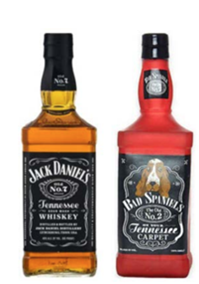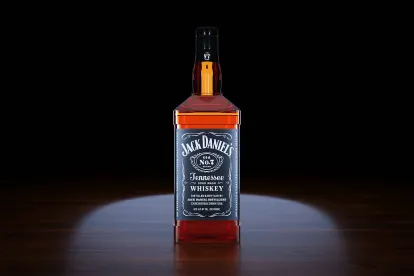Today, in a unanimous decision, the Supreme Court held that the First Amendment will not protect an infringers’ use of a confusingly similar trademark for its goods – even if it is a humorous parody. Justice Kagan writing for the Court held that the First Amendment does not give infringers license to trade on the goodwill or dilute the trademark of a brand owner under the guise of free expression. This “narrow” opinion, however, does not comment on whether and when use of a confusingly similar mark as something other than a source identifier, is protected expression under the First Amendment.
The facts at issue in this case are pretty straightforward: VIP Products LLC make dog toys modeled after famous alcoholic beverage bottles and labels. Jack Daniels Properties, Inc. makes, well, Jack Daniels whiskey. This case arose out of VIP’s sale of a squeaky dog toy called “Bad Spaniels” that was modeled after the renowned Jack Daniels bottle.

At a bench trial in the district court, Jack Daniels prevailed by presenting survey evidence showing that the Bad Spaniels brand was likely to confuse consumers about the source of the Bad Spaniels toy. The Ninth Circuit reversed. The Ninth Circuit held that, as a parody with a “humorous message,” the Bad Spaniels product was entitled it to First Amendment protection – regardless of whether consumers were confused about the source of the products or whether it diluted the Jack Daniels brand.
The Supreme Court held that Ninth Circuit got it wrong. The First Amendment does not protect VIP’s use of the Bad Spaniels mark as an indicator of the source of the goods – regardless of whether it is somehow expressive speech. The Ninth Circuit had relied on the Second Circuit’s 1989 opinion in Rogers v. Grimaldi, holding that the Fellini film “Fred and Ginger” did not infringe Ginger Rogers’ right to the use of her name. Justice Kagan distinguished Rogers and its progeny by noting that none of those cases involved the use of a confusingly similar mark to indicate the source of the goods. Under Rogers, use of another’s trademark in an expressive work might not pass muster if the challenged use has no relevance to the underlying work or where it expressly misleads as to the source or content of the work. The Court gave several examples that would be permitted under Rogers, including the use of “Barbie Girl” as a song title, the use of a trademarked football uniform in artwork, and references to Louis Vuitton in a film.
Thus, unlike VIP’s Bad Spaniels’ mark, none of those uses sanctioned under Rogers could have confused consumers as to the source of the goods. “‘Whatever first amendment rights you may have in calling the brew you make in your bathtub ‘Pepsi’ are ‘outweighed by the buyer’s interest in not being fooled into buying it.’”
The Court also summarily reversed the Ninth Circuit’s holding that VIP’s Bad Spaniels mark was noncommercial under the anti-dilution statute because it was a parody. Without getting into whether VIP’s use was not, in fact, “commercial,” the Court reasoned that the “ ‘non-commercial use’ exclusion . . . cannot include . . . every parody or humorous commentary.” Fair use, the Court held simply does not apply when using a mark as a designation source for the person’s own goods or services. “In that event, no parody, criticism, or commentary will rescue the alleged dilutor.”
While the Court held that the First Amendment does not save a confusingly similar parody mark, it also took pains to note that not all parodies are necessarily confusingly similar. The Court reiterated that the touchstone of trademark infringement is likelihood of confusion. A parody trademark’s “expressive message” . . . “may properly figure in assessing the likelihood of confusion.” If the “message of ridicule or pointed humor comes clear,” then a “parody is not often likely to create confusion.”
The Court remanded for “further proceedings consistent with [its] opinion.” Given that the district court had found infringement, one might assume that it is game over for VIP and its Bad Spaniel brand. However, in an interesting concurrence that appears to be directed to proceedings on remand, Justice Sotomayor, joined by Justice Alito, urged lower courts to use caution in admitting surveys as evidence to prove parody trademarks are confusingly similar. Justice Sotomayor pointed to specific survey answers offered as evidence by Jack Daniels showing that there may be “mistaken belief among some survey respondents that all parodies require permission from the owner of the parodied mark.” Permitting brand owners to take advantage of these misunderstandings could give “well-heeled brands” an “effective veto over mockery.”
Whether Justice Sotomayor’s guidance will influence proceedings on remand remains to be seen. Nonetheless, we expect the concurrence will figure prominently into Daubert challenges to potential biases in survey evidence.
The case is Jack Daniel’s Properties, Inc v. VIP Prod. LLC, No. 22-148, 2023 WL 3872519 (U.S. June 8, 2023).





 />i
/>i

